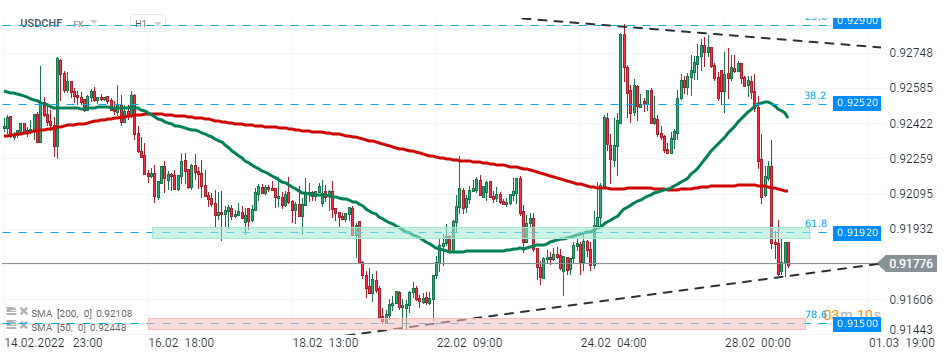- European stocks close lower
- Mixed moods on Wall Street
- Agricultural commodities prices rose sharply
- Bitcoin returns above $ 41,000
European indices finished a highly volatile February lower as investors continued to monitor the Russian invasion of Ukraine and the harsher retaliatory sanctions from EU and US. Western nations and Japan agreed to ban Russian financial institutions from the global payments system SWIFT closing Russia's capital account. Also usually neutral Switzerland decided to impose sanctions on Russia. As a response Putin ordered nuclear deterrence forces to be in a state of readiness. Stocks took a breather after the first round of negotiations ended. No significant progress was recorded, however considering the fairly long duration of the talks and the fact that a second round of negotiations will take place, suggests that there is at least a bit of common ground. Also Ukrainian President Volodymyr Zelenskiy signed an official request for Ukraine to join the European Union. Zelenskiy asked the EU to launch a special procedure as it defends itself from invasion by Russian forces. Additionally Ukraine and its allies requested the United Nations to investigate possible war crimes committed by Russia during its recent military actions. Shares of European banks took heavy losses with Deutsche Bank falling 8%, the most on the DAX 30.
Wall Street indices swing between gains and losses after Washington banned US individuals and firms from transacting with the Central Bank of Russia, Russian National Wealth Fund, and the Ministry of Finance. Recent sanctions sparked an exodus of capital from Russian companies as investors ditch their holdings despite attempts by its central bank to staunch the flow.
Tense geopolitical situations increased activity of speculators on the commodity market, in particular in the agricultural sector. Wheat rose almost 8% up, soybeans added over 3.50% and corn jumped nearly 6.0%. Crude oil erased early gains and now WTI hovers around USD 96 per barrel.
Today we could also observe elevated volatility in the FX market and increased demand for safe haven currencies. The Russian ruble fell 16% against the dollar, but the declines slightly decreased after the decision of the Russian central bank to raise interest rates from 9.5% to 20%. The ruble recorded a new historical low during today's session.
The real winner of today's session is Bitcoin, which rose almost 10% and broke above $ 41,000 level due to the potential transition of Russia's financial and payment infrastructure to the crypto market. These are not just rumors, as the main representatives of the Kremlin establishment have already spoken favorably about the entire sphere of digital assets. Many observers believe that Russian entities should have prohibited access to the cryptocurrency market and their assets should be frozen. Altcoins followed in Bitcoin footsteps. Ethereum gains 6.5% and Cardano rose 8.8%.
 USDCHF pair fell sharply during today’s session and is currently testing the lower limit of the triangle formation. Should break lower occur, downward move may accelerate towards next support at 0.9150 which coincides with 78.6% Fibonacci retracement of the last upward wave. On the other hand, if buyers manage to regain control then resistance at 0.9192 may be at risk. Source: xStation5
USDCHF pair fell sharply during today’s session and is currently testing the lower limit of the triangle formation. Should break lower occur, downward move may accelerate towards next support at 0.9150 which coincides with 78.6% Fibonacci retracement of the last upward wave. On the other hand, if buyers manage to regain control then resistance at 0.9192 may be at risk. Source: xStation5

Morning Wrap: Global sell-off in the technology sector (13.02.2026)

Daily summary: Silver plunges 9% 🚨Indices, crypto and precious metals under pressure

US100 loses 1.5% 📉

🚨Gold slumps 3% amid markets preparing for Chinese Lunar Year pause


